"Aye Raat Zara Ahista Guzar" - J P Kaushik
Freedom fighter, an ex-Indian Air Force Officer, an Expert Swimmer, a devout fitness freak and an inimitable music composer….these are the adjectives which describe an old die hard music composer, Jagphool Kaushik, whom music lovers know as Shri J P Kaushik. He started his career with Shehar Aur Sapna, a 1963 released film by writer, producer & director Khwaja Ahmad Abbas. Though he has very selective films in his repertoire, he never compromised in the quality of his music and proved his mettle with his quality music compositions.
Originally from Parhawar, a village in Rohtak district, one of the oldest cities near Delhi in Haryana, from where his grandfather, an employee in the police department left his village and settled in the city of Rohtak, and the ancestral home and agricultural lands are testimony to that. His father, Pandit Ram Gopal Kaushik was working in Dunlop, as a supervisor, in Delhi. Born on the 12th October 1924 in the old city of Rohtak, Jagphul Kaushik matriculated from Gaud High School, in the 1st Division took admission in the 11th the Government College. Young, Jagphul Kaushik could not stay away from participating in the freedom movement, not because it was if not impossible but difficult to stay untouched by the spirit of struggle for the freedom of our country at its peak but also, because of the passion of a young patriot, whose father, Shri Ram Gopal Kaushik had just kicked his job as he could not take orders from his British superiors. He left his studies of 11th standard and jumped in the fray of freedom movement. He used to distribute pamphlets around after secretly cyclostyling them in the fields. Then later on 8th of January 1943, he joined Indian Air Force, then Royal Air Force and in his first posting went to Lahore. He was then just an eighteen year old young man and one of the first few young men to join the air wing of the military from the city of Rohtak. One peculiar fad or custom, of those days, in that part of the country among the young men was, that they used to add ‘Singh’ to their names; probably showing their sodality with the firebrand icon of Bhagat Singh. Jagphul Kaushik became J. P. Singh in the air force in the technical area. As a pensioner, he still has his official papers in the name of J.P. Singh, in the Air Force.
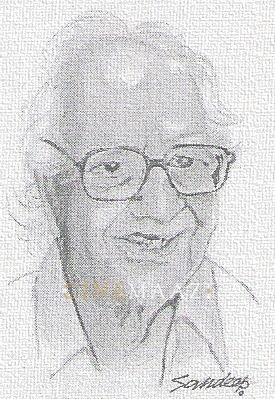
His passion for music was not new in the family; as a matter of fact, while his ears reverberated with the Holi folk songs, his grandfather sang holi with Duff, (a big leather strung on a wooden round framed percussion accompaniment of a folk singer) during the festival of colours, Holi, in their courtyard with an assembled gathering of neighbours & relations. His father too, was very fond of singing with the accompaniment of a German reed-harmonium; the reeds of that harmonium have now reached the fourth generation in the family in the hands of J P Kaushik’s grand daughter, Nima, the elder daughter of his musician-composer son, Sunil Kaushik. So the journey of the harmonium, which started from Kaushik’s father and then it was always part of his rucksack of a soldier, even in the remote postings of his, in places like Lahore, Ambala, Kohat, Karachi & air force stations of Fanny in now Bangladesh, Burma front, Jodhpur, Madras (Chennai). The remotest of his postings found this harmonium to be with him even in the front-line Air Force stations. During his posting in Karachi, he happened to see a violin in the Karachi Club and he learnt to play all by himself by constantly practicing. Singing and playing the instruments in the social functions in the Air Force was part of his life, but music was just a hobby. It never crossed his mind to adopt it as a profession. To commercialise his music in the film industry came to his mind only when his colleagues and friends prodded and encouraged him.
Among such colleagues was one Mr. K P S Tandon, who also used to present him with books he used to procure from the renowned Indian classical music foundation of Hathras. This colleague, Mr. Tandon very soon left the Air Force and went back to his home town, Dehradoon. Kaushik ji is very eager to meet him and family members even today as he is sure that even if Mr. Tandon may have heard or read about him, he would not have placed him as the same person whom he had encouraged in the Air Force as he knew him as J P Singh and not as J P Kaushik.
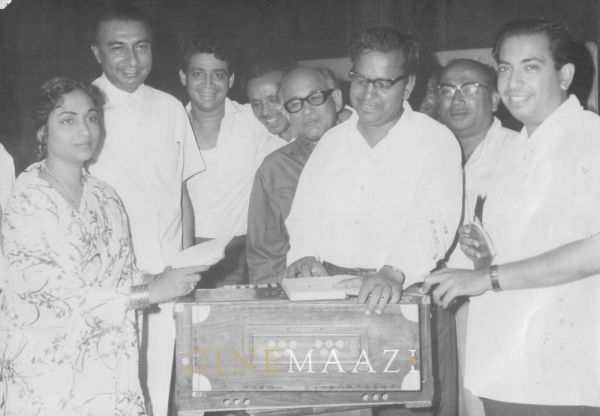
During the partition of India, Mr. Kaushik was posted in Karachi and later he was posted in Jodhpur, where he happened to meet the great sarod player, Ustad Ali Akbar Khan during one of the Air Force functions. Those days, Ustad Ali Akbar Khan was the court-musician of the Maharaja of Jodhpur. Kaushik ji formally started learning music from Ustad Ali Akbar Khan. As advised by the teacher, Ustad Ali Akbar Khan, Kaushik ji kept violin as his medium of education in music. During this period, he became friendly with the music composer Jaidev as he used to come to Jodhpur to meet Ustad Ali Akbar Khan. After more than four years in the tutelage of Ustad Ali Akbar Khan, Kaushik ji was posted to Taambram in Madras, which as per Kaushik ji, was the golden period for a posting because it was during this period that he met the greats in the south, in the field of music and dance like, the Kathakali masters Guru Gopinath and Thangamanee, classical singer Shri Subramanyam Aiyyar, Bharatnatyam danseuse Bala Saraswatee and Ustad Ameer Khan, originally from Kalanaur, Mewat.
Kaushik ji used to spend his two month annual leave from his Air Force service in Mumbai every year. Most of his time during those visits used to be in the recording rooms of Sachin Dev Burman and Jaidev. That is how he learnt the technical knowledge about film music without assisting any music directors.
After resigning from Indian Air Force on 19th July 1959, J P Kaushik came to Mumbai and at the advice of music director guru bhai Jaidev met the gentleman singer Mukesh and recorded two private geets Aaj Gagan Se handa Utara Aa Gaya Meri Bahon Mein & Baat Adhuree Rah Gai Aaj Mujhe Kah Dene Do written by Madhukar Rajasthani with H.M.V. and with this disc of private geets began his movement in the circle of renowned writers and film makers of those days, like Guru Dutt, Mohan Segal, Khawaja Ahmad Abbas, Rajinder Singh Bedi, Pt. Mukhram Sharma, Ali Sardar Jaffri, Kaifi Azmi and Sahir Ludhianvi
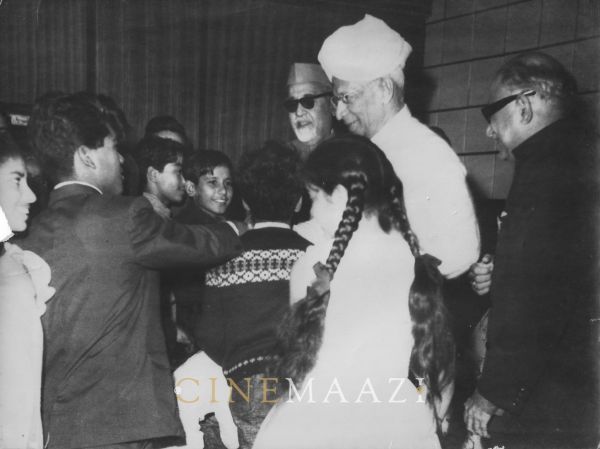
In Madras, now Chennai, on the sets of the film Insaaniyat in the Gemini Studios, Kaushik ji met the writer of the film Ramanand Sagar and actors Manmohan Krishna & Gajanan Jagirdar, who were in the guest house of Gemini Studios. In Mumbai he kept contact with them. Manmohan Krishna was a very good singer as well and once he recited in tarrannum a nazm. Kaushik ji immediately tuned it into a new tune. Manmohan Krishna was very happy with the composition and asked him to tune another nazm and after rehearsing in attendance of Kaushik ji recorded them in his own voice. After recording Manmohan Krishna told Kaushik Sahab that he has to sing these nazms in the forthcoming film of Khwaja Ahmad Abbas titled Shehar Aur Sapna. Abbas sahib also liked the tunes of the nazms immensely and asked Kaushik ji to shoulder the responsibility of composing music for the entire film, despite the fact that once when Kaushik ji had met Abbas Sahab and asked for work, Abbas Sahab had told Mr Kaushik, very emphatically that Mr. Anil Biswas was the permanent music director of his banner and it would not be possible for him to replace his old colleague. Anil Biswas, had by then not only given music for Abbas Sahib’s previous films like Munna (1954), Rahi (1952), Pardesi (1957), and Char Dil Char Raahen (1959) but had also recorded two songs for the current under production film Shehar Aur Sapna, which were later removed from the film.
Both the nazms, written by Ali Sardar Jafri, sung by Manmohan Krishna and composed by Mr J.P. Kaushik, Yeh shaam bhee kahaan huee & Pyaar ko aaj nai tarah nibhanaa hoga were very well appreciated. That is how began the film career of Mr J.P. Kaushik in 1963 with the film Shehar Aur Sapna.
Shehar Aur Sapna was adjudged the best film of the year 1963 and was presented with Gold Medal by the President of India. Besides, it got not only the best film awards but the best music awards from none other than the Association of Bengal Film Journalists and Association of U P Film Journalists and many more awards in different categories. During the function of President’s Gold Medal presentation, when the whole unit was present in Delhi with Abbas Sahib, Pt. Jawaharlal Nehru suggested Abbas Sahib to also make a film for children. Abbas planned and made a film for children titled Hamara Ghar and released in 1964 in which music director J P Kaushik composed four songs. A new singer Vijaya Mazumdar sang the Sare jahaan se achha, Chale hawaa puwaaee, Raja ji pachhataayenge and Mahendra Kapoor sang Tujhko apnee duniyaan aap bananee hai. A special show of this film was organized for the then President Dr. Sarvapalli Radhakrishnan with all the child artists and technicians of the film which was also attended by the then Vice President Dr. Zakir Hussain. This film also had Sunil Kaushik, son of Mr J P Kaushik and present-day noted actress Neelima Azeem’s brother, Pasha Azeem, grandson of Abbas Sahab, playing major roles as child artists.
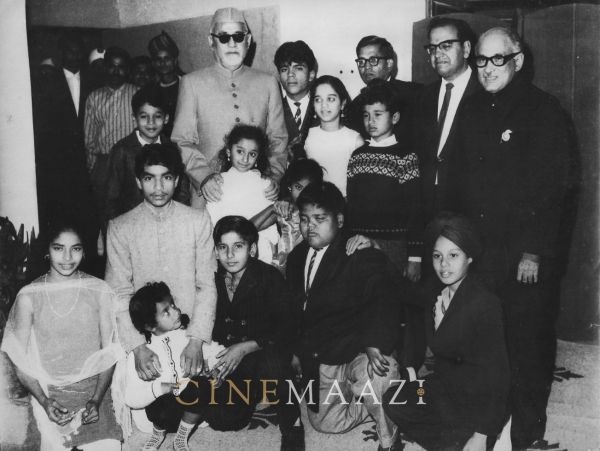
1965’s K A Abbas film Aasmaan Mahal had compositions of J P Kaushik in the form of Khoobsoorat hai teri tarah shikayat teri (Mahendra Kapoor), Toone samjhee hee naheen kyaa hai haqeeqat meri (Vijaya Mazumdar), Main aahen bhar naheen sakta (Mahendra Kapoor, Vijaya Mazumdar) and a mujra Aye raat zaraa aahista guzar sung by none other than Geeta Dutt, which is rated among the best songs Geeta Dutt has sung. This song, sung by Geeta Dutt had singer-actor, Madhukar, singing along, the part which was to be picturised on him in the film.
Recalling Geeta Dutt, Kaushik ji says, “Geeta was passing through very difficult times, then. Guru Dutt’s death was still fresh. Children were very young. Personally I very much liked the quality of Geeta’s voice and was very much convinced about her capability to sing this mujra but my decision met with some opposition also. After some cajoling J P Kaushik said, recordist Kaushik of Mehboob Studio said that Geeta is in no condition to sing, as she is always in a state of inebriation. She often forgets while singing. But I was adamant and would not budge from decision. Before going to the studio for the recording I rehearsed with her thoroughly for days together. In my limited association with her and despite her sad personal life, I found Geeta to be extremely gentle, very well cultured, sweet natured and artistically rich lady. All the sensational stories had no element of truth in them about her but were more of rumour mongering. Later on, again I got her to sing a lullaby Naani kehti thi ek kahani in one my music assignments for Children Film Society’s Bandar Mera Saathi (1966) made by senior actor Shri Gajanan Jagirdar.”
J P Kaushik also got Shanti Mathur to sing two songs to be picturised on a teenager boy for Bandar Mera Saathi. Two films made by Khwaja Ahmad Abbas Bambai Raat Ki Baahon Mein & Saat Hindustani, the debut film of Amitabh Bachchan, were released in 1969; and both of them had music composed by music director J P Kaushik. In the film, Bambai Raat Ki Baahon Mein all the four songs written by Mr Hasan Kamal. The title song was sung by Asha Bhonsle. The other songs were, Dill jo duniyaan ke gham-o-dard se ghabraya hai (Mahendra Kapoor & debut singer Sulakshana Pandit), Usne jo kaha mujhse ek geet suna do na (Krishna Kalle) and Jalti hui jawaaniyaan (Mahendra Kapoor). For his music in Bambai Raat Ki Baahon Mein J P Kaushik was given the best music director award in 1969 by The U P Film Journalists Association and on the other hand in the same year the theme song, played a number of times in the film, Aandhee aaye ya toofan koi gham naheen of Saat Hindustaani won the Best National Integration Song of the year, which was penned by Kaifi Aazmi and sung by Mahendra Kapoor.
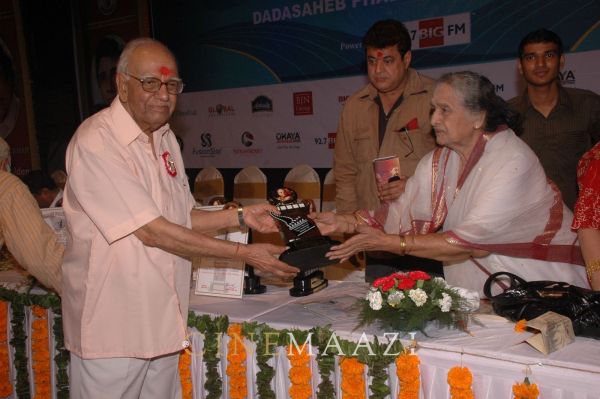
Besides the films of Khawaja Ahmad Abbas, music director J P Kaushik composed music for Rajinder Singh Bedi’s unreleased film Aankhin Dekhi, Rajdeep’s Basti Aur Bazaar (1973), producer Sukhdev Dhameeja's film, Dhamaka (1980), which was directed by Jagdish Sadana, Producer Harish Kataria’s film Sister (1980), Sumithra-Satish’s Sanjhi (1985) directed by Pradeep Hooda and one film Kishtee Lagee Kinaare for which he recorded two songs written by Sahir Ludhianvi.
He not only gave music for Hindi films but also composed songs for regional cinema in the languages of Rajasthani, Gujrati and his own mother tongue, Haryanvi. The only film made in the co-operative sector of Govt of Haryana - Bahuraani, then Chandrawal, Panghat, Lambardaar, Dhan Paraya, Batehoo, Phool Badan, Taqdeer Ki Taqraar, Laaddo Basantee, Bairee, Chandrakiran, Chhoree Sapele Kee and Chhoree Nat Kee. In Rajasthani language Dharam Bhai and Laaddo Raani and in Gujarati Mhari Laaj Raakhyo Beera saw his music cross the boundaries of his state of Haryana and the music of all these films was immensely popular. Songs composed for Chandrawal namely Jeeja Tu Kala Main Goree Ghhani and Mera Chundad Manga De Re O Nandee Ke Beera are sung even today after more that thirty years in the whole of north India especially during the weddings, be it small town or big cities. The super success of Mera Chundad Manga De re…… based on the folk of Haryana inspired Bappi Lahiri to use this tune in the film Sharaabi (1984) in the song Mujhe naulakhaa manga de re o sainyaan deewane.
Music director J P Kaushik used his skills not only with veteran singers like Manna Dey, Mohammed Rafi, Mahendra Kapoor, Asha Bhonsle and Geeta Dutt but also the new and upcoming singers of those days like Sulakshna Pandit, Krishna Kalle, Vijaya Mazumdar, Bela Sawar, Bhupendra Singh, Anuradha Paudwal, Dilraj Kaur and Preeti Sagar to make his music ever lasting in the hearts of common masses. For example, he got his melodies sung by Anuradha Paudwal in Baadal uthya ri sakhee mere saasre kee or, (Sanjhi), Dilraj Kaur in Tere mukhde pe jam gayee nazaria (Sanjhi) and Bhupendra Singh in Raat mein taaron bharee taaron ki anjuman (Sanjhi), Mohammed Rafi in Uth jaag musafir bhor bhayee (Aankhin Dekhi), Rafi & Sulakshna Pandit in Sona re tujhe kaise miloon (a super hit romantic duet from Aankhin Dekhi).
He got Sulakshna Pandit & Mahendra Kapoor to sing Hum to man moujee, Manna Dey to sing Hum patthar hain hum naheen rote, and new comer Bela Sawar to sing Ai jaane man nadaan na ban all of them for Rajdeep’s Basti Aur Bazaar. Incidentally, Bela Sawar is sister of internationally renowned jazz composer/singer Asha Putli. Bhupendra Singh sang Hai muqabala insaan kaa shaitaan se, Mahendra Kapoor & Bela Sawar sang O laal paree bund kalee, Asha Bhonsle sang Meri aankhon main sholey all for the film Dhamaka. Then came Sister where Asha Bhonsle sang Na tootee koi khidkee vidkee, Sulakshna Pandit sang Sachcha jiska pyaar jahaan main another version was sung by Preeti Sagar. There was another very soulful song sung by none other than Mohammed Rafi for the film Sister was Tu akela nahin tere jaise kai log hain.
Besides Ali Sardar Jafri the lyricists who wrote with music director J P Kaushik are Naqsh Lyallpuri, Hasan Kamal, Nida Fazli, Niyaz Haider, Sooraj Bhardwaj, Mahendra Dehlvi, Pushp Kumar Sharma and Padma Sachdev.
For his great contribution in the field of film music for almost 5 decades, music director J P Kaushik was given recognition by the film industry itself by awarding him a Life Time Achievement Award by the Dada Saheb Phalke Academy, Mumbai, on the 30th April 2010.
J P Kaushik fathered four sons, eldest Satish is a documentary, TV serial maker, Sunil is a renowned guitarist, music composer and arranger who was the 2008 Shantaram Best Music Award for his music in Marathi Film Check-Mate. The late third son Surendra was a manager in an Import-Export concern and the youngest son, Sanjay, who died very recently on the 19th Dec. 2010, was associated with film directors like Lekh Tandon in Agar Tum Na Hote, Sukhwant Dadda and Ajay Kashyap.
Presently Mr Kaushik is living in Santacruz, Mumbai, with the family of his late son Surendra. His wife Kaushalya died in 1984. At the age of 86, J P Kaushik is still active. He says, “I was always very fond of exercise and wrestling. During his service with Air Force he learnt swimming. The secret of my fitness has been, balanced food habits, living without any vices, exercise and swimming. I am still active in music composing. Recently, I recorded two songs for one Haryanvi film, Kunbaa. Whatever little, I have achieved in my life, if I have to give credit to then it would be to Ustad Ali Akbar Khan, my colleague of Air Force Shri K P S Tandon and Khawaja Ahmad Abbas, who always supported me and of course my late wife, who supported me all through my struggle time in Mumbai, with my four sons.”
J.P.Kaushik ji died in Mumbai on 14.03.2017 at the age of 93.
Translated from original Hindi to English by: Shri Satish Kaushik
Part of Shishir Krishna Sharma's Beete Hue Din blog series.



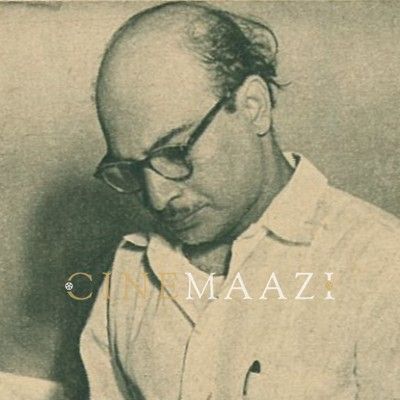
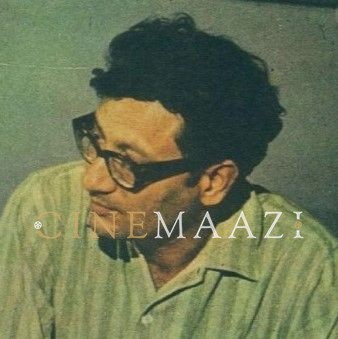
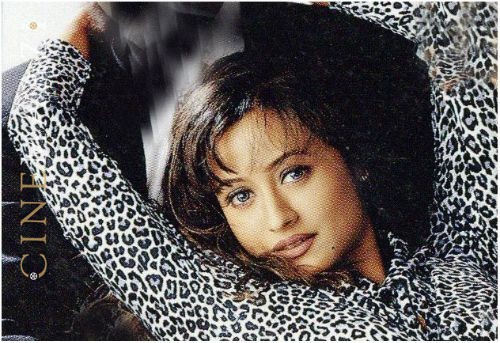
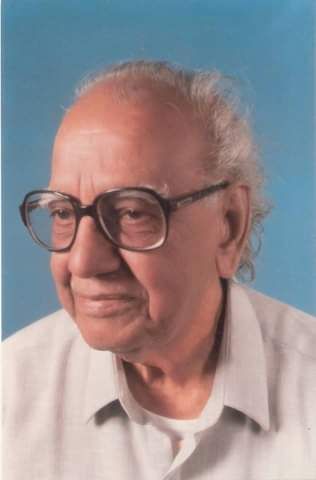
.jpg)


